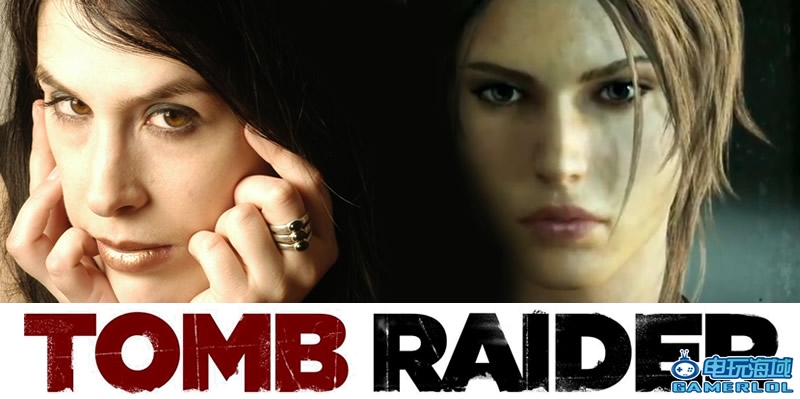来自TEDx Transmedia 对《古墓丽影9》首席编剧瑞安娜·普拉切特的访谈报道,由于原报道为全英文,所以这里首先转载两篇国内的摘选译稿,后面将有完整的英文报道。
《古墓丽影》(Tomb Raider)的首席编剧瑞安娜·普拉切特(Rhianna Pratchett)称自己目前只会将全部精力集中在本作上。
“重新启动这一知名游戏品牌和重塑劳拉这一经典角色令人振奋,我觉得这是一个挑战和机会,所以会将全部精力集中在本作上。不要问我未来这一系列将如何发展,现在谈这些为时太早。”

瑞安娜显然是在暗示系列之前就因为推出的太快太急,导致了游戏的品质不断下降,最终拖累了品牌声誉。因此她不想过早的思考没有确定的未来,同时近年来游戏业的飞速发展和变化也令未来充满了不确定性。
本作登陆PS3、Xbox360、PC平台。游戏将讲述劳拉的首次冒险之旅,她的年龄被设定在21岁,那时的她还只是一名刚出茅庐的新人,经验欠缺。随着游戏剧情的发展,玩家将与劳拉共同成长,获得新的武器和道具并习得新技能,然后再返回经过的地区尝试解谜。而射击瞄准将从以往的自动锁定变为自由瞄准。
——转载自《电玩海域》
自从《古墓丽影9》公布以来,许多玩家期望其能开创一个全新的时代,不过游戏剧情编剧Rhianna Pratchett却说她目前只想考虑当前的任务,没工夫想未来的事情。
她在最近的一次采访时说:“重新制作这样一个备受人们喜爱的角色是件非常有意义的事情,不过同时也让人非常伤脑筋。”
“现在就讨论未来的计划未免言之过早。我更加关心现实的问题,希望做到尽善尽美。我现在希望的就是给玩家们呈现一些有趣的吸引人的内容,或许可以让这一次的《古墓丽影9》重现当年《古墓丽影1》时的辉煌。”
谈及游戏中的性别歧视问题,Pratchett说对女性角色的表现匮乏确实是一个问题,不过这种情况同样适用于那些“非白人、20岁的男性、声音沧桑的角色”。
“这个游戏业需要尽可能的让角色形象更加多元化,以代表更多不同的群体。”
“如今,随着游戏产业的发展,玩家群体的年龄差异化的现象也越来越明显,此外性别,民族等元素也影响着玩家的倾向。因此,作为游戏开发者的我们,有义务打破禁锢,扩展思路,为玩家带来更多新鲜有趣的内容。从现在开始,我们关注的不应该是玩家从我们身上学到什么,而是我们应该从玩家身上学到什么。”
——转载自《新浪游戏》

采访原稿:
‘The heavy lifting lies in trying to find the sweet spot between story and gameplay.’ Q&A with games writer and TEDx Transmedia 2012 speaker Rhianna Pratchett.
Award-winning games writer Rhianna Pratchett has been named one of the top 100 most influential women in games and just been announced as the lead writer on the new Tomb Raider re-boot, one of the most successful gaming franchises ever made.
In this Q&A ahead of her talk in the ‘Geek’ section at TEDx Transmedia 2012, we chatted with her about everything from her love of facehuggers to what it’s like to get her hands on the First Lady of action gaming, Lara Croft.
It’s a great read for anyone interested in a from-the-trenches approach to the role of writing in games. Rhianna shares her industry pet peeves, her favourite projects and writing process, her thoughts on the dubious positioning of games writers’ as ‘narrative paramedics,’ the representation of women, race and sexuality in games and her early ambition to be a mermaid!
Don’t miss seeing Rhianna live at TEDx Transmedia. You can register here now.
Did you always want to be a writer? How did you get into writing for games?
I wrote a lot when I was a kid. But I actually wanted to be a mermaid, more than I wanted to be a writer. Unfortunately, my parents were unable to find a tail in the depths of rural Somerset, and so I turned to plan B. I studied journalism at university. Primarily, because I wasn’t sure what I wanted to do with my life. Journalism is great for uncertain people, because you get a taster of so many different things.
I’ve been a gamer since I was 6 and ended up going into games journalism (working for the UK’s late, great PCZone magazine) after I left university. After a few years on staff, I left to go freelance and was offered a job as a story editor on a hardcore role-playing game called Beyond Divinity. Suddenly I’d stumbled upon a career I never knew existed. After that, I utilise the contacts I’d gained as a games journalist and started to build my career.
You write for lots of different platforms, what are some of the differences in writing for games, film, TV, books and comics? Which do you enjoy most and why?
I enjoy them all in different ways. The games writing is always challenging and constantly changing, which can make it both very exciting and hair-pullingly frustrating.
The TV and film stuff is still relatively new, but I’m starting to really get a kick out of working with long form linear projects. If feels a lot like creating a narrative baby; from something blobby and half formed, right up to having a nose and fingernails! Writers are also taken more seriously in those entertainment fields than they are in games - although I really hope that will change one day.
I’m a fan of comics, so it’s always a joy to write for them. They have such a unique structure that it can be quite a jarring to go from writing a screenplay to writing a comic.
With the book stuff, it’s largely been short stories or contributing chapters to other books about the craft of games writing. It’s always great to take part in something that really feels like imparting positive and inspiring advice.
What’s your relationship with transmedia? What do you think of transmedia and what do you think transmedia can learn from games?
I feel that it’s more like what games can learn from transmedia; namely the importance of story and world creation. Keep that strong and central, and the possibilities are endless.
The theme of this year’s TEDx Transmedia, WEkids, is about harnessing child-like wonder and courage to make media that has a social impact. What do you see as the potential of that approach?
When it comes to games, we’re already reaching a broader audience than ever before. In fact the gamers themselves are becoming more diverse in age, gender and ethnicity, than the industry itself. Therefore I feel we have a responsibility to our audience to stretch ourselves to the very limits of our imagination and come up with absorbing gaming experiences, which entertain, enlighten, and even move, our audience. At this point in time we should be less about what they can learn from us and more about what we can learn from them.
The subheading is Dreamers, Geeks, Mindshifters; which do you most identify with and why?
I identify with all of them for different reasons. I’m at heart, a geek. Always have been, always will be. But it’s important for me to give something back to geekdom; to contribute and shape that world. In some small way, I’m hoping to mindshift the games industry and improve its approach to (and use of) writer and writing. Hopefully that will improve the experience for the gamers themselves. And that’s the ultimate dream.
What do you like about fellow geeks? And what’s the geekiest thing you own?
Geeks are about passion - often unrestrained passion. Be it for technology, entertainment or experiences. And there’s something truly wonderful about that. I guess the geekiest thing I own is a life-size facehugger. I’m a huge fan of the Aliens movies.
What’s the geekiest thing about you?
I’m not sure what the geekiest thing about me is, since there’s so much of my life which could be termed ‘geeky.’ I guess it’s the fact that I will often go back and replay old games I loved, rather than try new ones. That means I play things like Dungeon Keeper 2 on a yearly basis. I was also such a huge fan of playing Age of Mythology online that I bought copies of the game about 6 times and ended up deliberately breaking the CDs because I got too obsessed with playing. Obsessed, but sadly, never any better!
What did you want to be as a kid? What were your dreams and aspirations?
It was pretty much the mermaid thing. I blame Splash.
TEDTalks are renowned for their inspiration, energy and focus on the personal. Can you give us a taster of what you want to bring to Rome?
My approach is very much a from-the-trenches one. My theories and ideas are all based on my direct day-to-day experience and also those of fellow game writers. I’ve been lucky enough to have gained a certain amount of exposure in my career and I like using that to try and make the industry a little better for everyone.
But I also want to educate people about what writing for games is actually like, because there are so many misconceptions about what it involves. The more people who know what to expect and how to prepare for it, the greater our narrative armies will become.
You’ve jokingly referred to yourself as a ‘narrative paramedic’ but the term has gained some currency amongst the games writing community. Can you explain what you mean by it?
It started as a joke. Then I made it into a badge. And then I realised that for me the joke wasn’t funny anymore – it was a real problem.
‘Narrative paramedic’ stemmed from the way in which writers are often only involved very late in the development process, when the story is basically bleeding from 1000 cuts - usually because a professional writer hadn’t been taking care of it. At that point there’s not much you can do to help the narrative, aside from basically patching it up, and hoping it lives. It’s rather a soul-destroying experience.
It is getting a little better. Development studios are involving writers earlier on in the process, but still not soon enough or regularly enough. We’ve got a steep road to climb, but at least we’re heading in the right direction.
What are some of the challenges you face as a games writer, what are some of the pleasures?
The main challenge is that you’re working in an entertainment medium which doesn’t put story first. This means that the needs of narrative will always be competition with the needs of gameplay. Much of the heavy lifting lies in trying to find the sweet spot between the two. You’re also working in a medium which doesn’t have a high level of narrative literacy yet, either. At least not across the board. Partly this is due to the fact that we’re still a relatively young industry. But also because there are not enough genuine narrative professionals in it yet - either working in the trenches or wielding power at the top.
It can be a real pleasure working with a truly dedicated and creative team, who are really keen to make narrative and gameplay shine alongside each other. The industry is evolving, which can make it an intensely challenging place to be.
How does games writing challenge some of the conventions of linear storytelling and storytelling in other forms? Do you think it’s tough for writers in other forms, of novels for example, to write for games?
I believe that understanding the medium is vital for games writers, no matter what discipline they’ve come from. If you want to write for games, you should really play a few, maybe even read some books on design, so you know how games are put together. As I mentioned earlier, it’s a shock to the system to work in an entertainment medium that isn’t often story-led. Many companies have seen the benefits of employing professional writers, but they’re still working out how best to use them. Games writers are still seen as square pegs trying to fit into round holes.
How has the industry changed in the 14 years you’ve been working in it?
In terms of narrative, certainly. Now you’ve actually got games writers talking about what they do, and why. What goes right and what goes wrong. These are all important topics. You’ve got awards for games writing and landmark titles like Bioshock, Mass Effect and Portal, flying the flag for strong story-telling. The position of narrative designer is becoming a little more common place, which is vital for strengthening the way in which story intersects with gameplay.
You’ve just been announced as the lead writer on the Tomb Raider reboot (congratulations!) What do you want to do with the franchise? What has it been like to rewrite Lara Croft?
After writing videogame heroines like Faith in Mirror’s Edge and Nariko in Heavenly Sword, it was a wonderful opportunity to get my hands on the First Lady of action gaming. Also, being a Brit, it felt like a natural fit for me. My first industry event was actually a launch party for Tomb Raider 3!
Rebooting such a beloved character has been very rewarding, but also a little nerve-wracking at the same time. How often to you get the chance to go back and re-write history without the aid of a souped-up DeLorean?
It’s probably a bit too soon to say what I want to do with the franchise. I can’t really think further ahead than the current project. I just hope we can give players something entertaining and absorbing that may, one day, become as meaningful as the original Tomb Raider.
There is a huge debate and angry comment around the representation of women in games and comic books and the way in which they can often be objectified and trivialised. What do you think of the representation of women in games?
As a whole, it’s not great. But then neither is the representation of non-white characters, or gay characters or, in fact, any character who isn’t white, male, mid-20s and gravelly voiced. The games industry has a lot of work to do as far as character diversity and representation is concerned.
What kind of games writing do you admire? Do you have examples of games where you feel the narrative and game play worked really well?
I’m a huge fan of Double Fine’s Psychonauts. That used level design as story-telling in such an amazing way. It also managed to be funny and touching at the same time, which is hard to do in any medium. Bioshock and Bioshock 2 are a couple of more recent examples, along with Deus Ex: Human Revolution, which I thoroughly enjoyed.
Do you have any pet peeves in games writing?
It’s a minor, but a recurring, one. Namely, the way in which dialogue pools can be so limited for the characters you interact most with - specifically, merchants. You end up going to see them all the time and when they continually say the same two lines over and over again, it really breaks the immersion. They’re a perfect opportunity to bring life to a world and react to a player’s actions, but they’re constantly underused.
You’ve worked on loads of different games and game genres, from Mirror’s Edge to CSI to Overlord. What’s the most fun you’ve had on a project and why?
Definitely Overlord and Overlord 2, with Triumph Studios. Those games were as fun to work on as they were to play. It was a relatively small team, compared to my other projects, but there was a lot of respect and trust there. We all gelled together really well and it’s always been my near-perfect model of a good writer/developer working relationship.
How do you go about researching for a project?
The usual ways – books, the Internet and documentaries. Plus the general knowledge and imagination floating around in the narrative gumbo inside my head.
Where do you write and what’s your process? Do you have a shed at the bottom of the garden?
I tend to move around my house when I work. Sometimes I’ll write in my ‘winter office’ a.k.a. bed. Other times I’ll write in my garden. Given that I live in a busy part of London, my garden actually consists of several herb pots and an orchid on my kitchen table. I don’t really have a process to speak of, aside from: write, write more, rewrite, write better etc. There’s also a bit of film watching and game playing thrown in for good measure.
What in your life are you most passionate about? And what do you do outside of work?
Writing, of course. But I also love cooking, I find it very therapeutic and I firmly believe in the healing power of my tiramisu. I am an avid film watcher and have a vast and varied collection of movies that would put the average Blockbusters to shame. I love scuba diving – it’s a big investment of time and energy, but once you get under the water, it’s all worth it.





